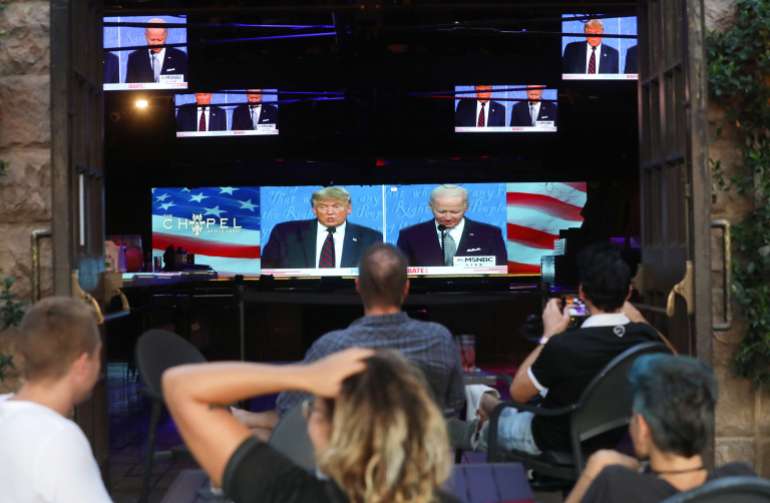Four years ago, news reports spread on the Facebook platform claiming that Pope Francesco supported the then Republican presidential candidate Donald Trump, and another report that a government investigator was found investigating the email case of Democratic candidate Hillary Clinton was murdered.
No one knows for sure the impact of that news on voters' choices, but this prompted the Facebook network to do a great effort to prevent it from being used as a platform to spread lies or misinformation.
And Facebook has become in the forefront of news related to the announcement of the upcoming presidential results, in light of the expectation of delaying its announcement due to the huge number of voters by mail, at a time when Facebook did not escape from Republican and democratic criticism.
Democratic and Republican attacks
Facebook, and other popular social media platforms, such as Twitter, Instagram, and YouTube, are subjected to constant attacks and criticism from the two candidate campaigns: Republican Donald Trump and Democrat Joe Biden.
Biden's campaign demanded that Facebook remove President Donald Trump's posts, describing the major social network as "the leading publisher of disinformation about the voting process in the country."
For its part, the Trump campaign calls on Facebook to stop restricting the content of its supporters' pages or to disable the many pages that support it, with hundreds of thousands and sometimes millions of followers.
A Facebook spokesperson responded to these accusations, and stated to the Axios news site that his company is facing bipartisan criticism, stressing that Facebook has rules to protect election integrity and freedom of expression, and stressing that they will continue to implement them fairly.
It is noteworthy that Trump and Biden use Facebook to directly address their supporters and encourage them to vote for them, and President Trump subscribes nearly 30 million followers, while former Vice President Joe Biden follows 3 million people.
The Facebook platform - like other communication platforms - is under scrutiny to monitor its credibility in the upcoming US elections (Reuters)
Facing a new reality
And Facebook announced that it has updated its rules on publishing information and political advertisements related to the US elections.
The company said it will block ads that describe the election results as inactive, say there was widespread fraud, or attack any of the polling methods.
The company also reviewed its strategy for dealing with the upcoming elections and how to publish and examine what is published on its website, and issued several statements detailing its new plans, including:
Commitment to secure its pages, provide the necessary transparency, and encourage citizens to vote.
The launch of a new voting and polling information center that contains much necessary and important information related to voting.
Triple the work team supervising security and safety, reaching 35,000 people.
Implementing a strict 5-step mechanism to verify the identity of political advertisers and seekers.
Expanding anti-disinformation efforts to protect voters from attempts at distortion and deception.
Americans follow the activities and ideas of presidential candidates on the two major parties (Getty Images)
Facebook and political disinformation
However, many technology experts believe that Facebook is limited to confronting it with big and well-known names, which allows many unknown people or entities widely known to spread as many lies and misleading information as they want.
And Facebook was a forum for many rumors, lies and distortions, and this included unfounded conspiracy theories, from the truth of the emerging Corona virus, to questioning the viability of postal ballot boxes and voter fraud.
Social media researchers say that "sinister" actors use the suspicion caused by the Corona epidemic to confuse voters about how to vote and undermine confidence in the election results, and even threaten to spread violence.
Experts believe that Facebook has not done enough to protect the credibility of the upcoming election. In some cases, outside powers - Russia, China or Iran - only need to amplify and repeat the lies that Facebook users spread from inside the United States.
Election observers are particularly concerned about efforts to undermine confidence in the vote, which President Trump himself does repeatedly, through his tweets and posts on Facebook and other platforms, including his claim that ballot papers are vulnerable to fraud.
And Facebook announced its tightening of the rules against misleading information to vote, especially what could cast doubt on the election results and premature claims of victory before the results are final.
The biggest social media companies meet monthly with government and law enforcement agencies to discuss and respond to threats, and officials on both Facebook and Twitter say they are ready to take measures to eliminate content that poses a threat of harm in the real world, such as violence or voter suppression.
Trump has repeatedly declared on various occasions that the large-scale postal ballot will lead to "the most corrupt elections in the history of our country," but by contrast, FBI Director Christopher Ray - along with many other national security and election officials - offered guarantees that Election systems are safe, and it will be extremely difficult to manipulate actual votes, in person or by mail.
The big question remains: What will Facebook do to stop the spread of misinformation if it takes days or even weeks before the final election results are announced?

